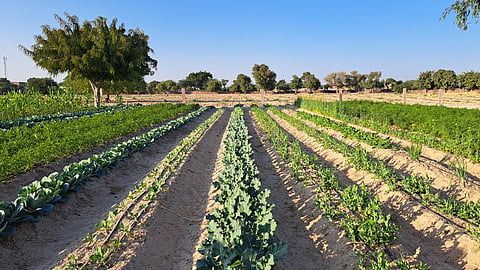An exotic oasis called Mharo Khet
If you are lucky enough to live in, or indeed own a farm, there’s little to match the joy of plucking a pomegranate, guava or papaya from a selection of trees. Or, if you are so inclined, to dig up fresh carrots, beets, potatoes and so forth.
I regard myself as an anthophile, though maybe plantsman is a more apt description, and a farm visit is an alluring proposition at any time. To visit a farm in the middle of a desert where you could do the above, and also pluck cherry tomatoes, baby corn, bell peppers, zucchini, arugula, Bok choy, dill, kale (curly or flat), Swiss chard, or lettuce at will is joy rarely paralleled.
A range of gourds could be more to your taste – bottle, bitter, ridge or apple. Or the common cabbage, lemon, okra, eggplant, chillies... To make your food more flavourful, there’s basil, mint, lemongrass, parsley, sage, oregano and coriander. Not to overlook giloy, baby spinach, beans (cluster and long) … Then there are the staples – wheat, bajra, jowar, chana, mung, moth. Edible flowers include nasturtium, basil, zucchini and butterfly pea, the latter also available as a tea/infusion, for which other options include lemongrass, chamomile and moringa.
Yes, Mharo Khet, about 25 kms north of Jodhpur in an arid zone, is home to about 80 varieties of plants. A local, Rajnush Agarwal and his wife, Vedika, set up this venture, and have turned their 40-acre ancestral land into an experiential farm.
Unique journey
During a trip to Kyoto in 2019, the couple were inspired by the famed reputation of the vegetables grown in the city. As the family already owned the farm, the couple decided to experiment, starting in November 2020 with an ambitious promise – delivery within 4 hours of harvest.
The choice to go in for exotic vegetables was driven by the desire to be unique. “If you can offer your customers something exclusive, you will get a good customer base,” says Rajnush, a biochemical engineer from Oxford, displaying the greenhouse which is the focus of the farm. The going wasn’t easy of course, and consultations with the Central Arid Zone Research Institute (CAZRI), Jodhpur, the Research Centre for Desert Vegetation and IIIM (Indian Institute of Integrative Medicine) in Jammu followed.
Suitable technology was extensively implemented, none more so than water retentive steps such as drip irrigation and aeroponics. Buzzwords such as responsible agriculture that is regenerative for the soil and promotes polyculture of plants are visibly present here. Experimentation in cropping, entirely organic, was extensive, including permaculture of native trees. Today, Mharo Khet supplies extensively to the city’s culinary establishments, and also beyond. Online registrations for fixed tokri/baskets of produce are a popular choice.
Mharo Khet now offers farm tours and seven-course set meals, plated to match a luxury hospitality experience. For the average traveller, the main attractions seem to be reconnection with nature – whether it is dining in a guava orchard, cool even in the desert sun, traipsing around a plethora of crops (even plucking and eating right there!) or just enjoying the breeze on a swing under an imposing rohida tree.
Of course, whether it’s gasping at a larger-than-human-head sunflower or posing with multihued capers and peppers, it is all very swoon-worthy. Once you take a tractor ride from Mharo Khet’s gate, the rest of the world and its burdens seem to fall away.

